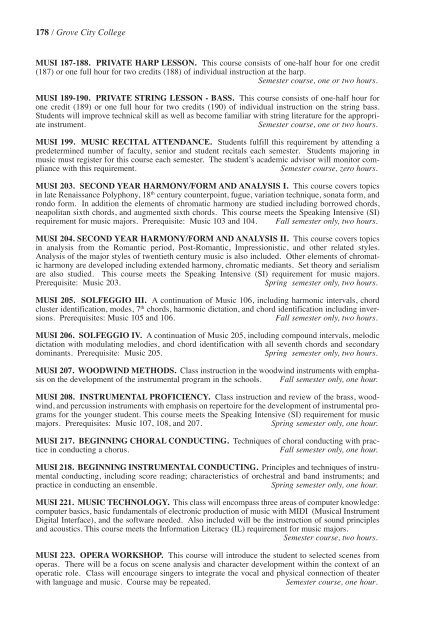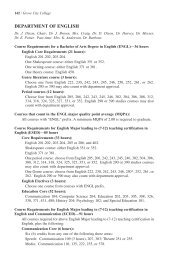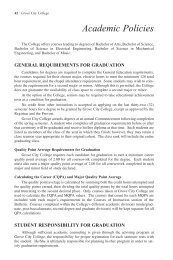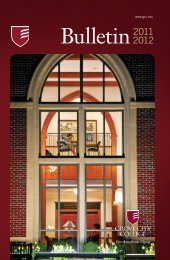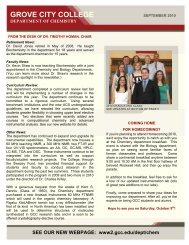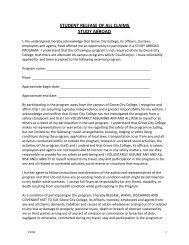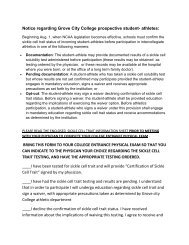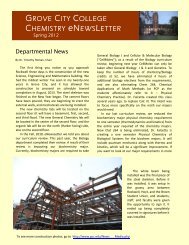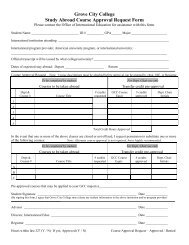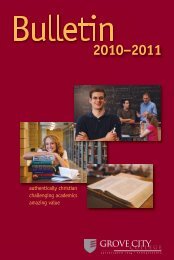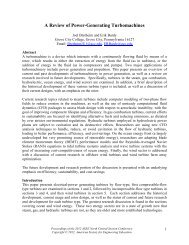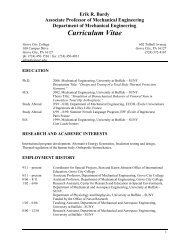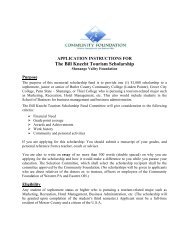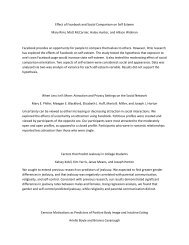2009–2010 - Grove City College
2009–2010 - Grove City College
2009–2010 - Grove City College
You also want an ePaper? Increase the reach of your titles
YUMPU automatically turns print PDFs into web optimized ePapers that Google loves.
178 / <strong>Grove</strong> <strong>City</strong> <strong>College</strong><br />
MUSI 187-188. PRIVATE HARP LESSON. This course consists of one-half hour for one credit<br />
(187) or one full hour for two credits (188) of individual instruction at the harp.<br />
Semester course, one or two hours.<br />
MUSI 189-190. PRIVATE STRING LESSON - BASS. This course consists of one-half hour for<br />
one credit (189) or one full hour for two credits (190) of individual instruction on the string bass.<br />
Students will improve technical skill as well as become familiar with string literature for the appropriate<br />
instrument. Semester course, one or two hours.<br />
MUSI 199. MUSIC RECITAL ATTENDANCE. Students fulfill this requirement by attending a<br />
predetermined number of faculty, senior and student recitals each semester. Students majoring in<br />
music must register for this course each semester. The student’s academic advisor will monitor compliance<br />
with this requirement. Semester course, zero hours.<br />
MUSI 203. SECOND YEAR HARMONY/FORM AND ANALYSIS I. This course covers topics<br />
in late Renaissance Polyphony, 18 th century counterpoint, fugue, variation technique, sonata form, and<br />
rondo form. In addition the elements of chromatic harmony are studied including borrowed chords,<br />
neapolitan sixth chords, and augmented sixth chords. This course meets the Speaking Intensive (SI)<br />
requirement for music majors. Prerequisite: Music 103 and 104. Fall semester only, two hours.<br />
MUSI 204. SECOND YEAR HARMONY/FORM AND ANALYSIS II. This course covers topics<br />
in analysis from the Romantic period, Post-Romantic, Impressionistic, and other related styles.<br />
Analysis of the major styles of twentieth century music is also included. Other elements of chromatic<br />
harmony are developed including extended harmony, chromatic mediants. Set theory and serialism<br />
are also studied. This course meets the Speaking Intensive (SI) requirement for music majors.<br />
Prerequisite: Music 203. Spring semester only, two hours.<br />
MUSI 205. SOLFEGGIO III. A continuation of Music 106, including harmonic intervals, chord<br />
cluster identification, modes, 7 th chords, harmonic dictation, and chord identification including inversions.<br />
Prerequisites: Music 105 and 106. Fall semester only, two hours.<br />
MUSI 206. SOLFEGGIO IV. A continuation of Music 205, including compound intervals, melodic<br />
dictation with modulating melodies, and chord identification with all seventh chords and secondary<br />
dominants. Prerequisite: Music 205. Spring semester only, two hours.<br />
MUSI 207. WOODWIND METHODS. Class instruction in the woodwind instruments with emphasis<br />
on the development of the instrumental program in the schools. Fall semester only, one hour.<br />
MUSI 208. INSTRUMENTAL PROFICIENCY. Class instruction and review of the brass, woodwind,<br />
and percussion instruments with emphasis on repertoire for the development of instrumental programs<br />
for the younger student. This course meets the Speaking Intensive (SI) requirement for music<br />
majors. Prerequisites: Music 107, 108, and 207. Spring semester only, one hour.<br />
MUSI 217. BEGINNING CHORAL CONDUCTING. Techniques of choral conducting with practice<br />
in conducting a chorus. Fall semester only, one hour.<br />
MUSI 218. BEGINNING INSTRUMENTAL CONDUCTING. Principles and techniques of instrumental<br />
conducting, including score reading; characteristics of orchestral and band instruments; and<br />
practice in conducting an ensemble. Spring semester only, one hour.<br />
MUSI 221. MUSIC TECHNOLOGY. This class will encompass three areas of computer knowledge:<br />
computer basics, basic fundamentals of electronic production of music with MIDI (Musical Instrument<br />
Digital Interface), and the software needed. Also included will be the instruction of sound principles<br />
and acoustics. This course meets the Information Literacy (IL) requirement for music majors.<br />
Semester course, two hours.<br />
MUSI 223. OPERA WORKSHOP. This course will introduce the student to selected scenes from<br />
operas. There will be a focus on scene analysis and character development within the context of an<br />
operatic role. Class will encourage singers to integrate the vocal and physical connection of theater<br />
with language and music. Course may be repeated. Semester course, one hour.


